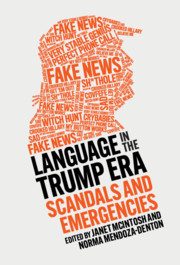Book contents
- Language in the Trump Era
- Language in the Trump Era
- Copyright page
- Dedication
- Contents
- Figures
- Tables
- Contributors
- Acknowledgments
- Note on Transcription Conventions
- Note on Ethnonyms and Phenotypic Descriptors
- Introduction: The Trump Era as a Linguistic Emergency
- Part I Dividing the American Public
- Part II Performance and Falsehood
- Part III The Interactive Making of the Trumpian World
- Part IV Language, White Nationalism, and International Responses to Trump
- 15 Part IV Introduction: Language and Trump’s White Nationalist Strongman Politics
- 16 “Perfect English” and White Supremacy
- 17 Making Our Nation Fear the Powerless
- 18 We Latin Americans Know a Messianic Autocrat When We See One
- 19 Rejoinders from the Shithole
- 20 Muslim Enemies, Rich Arab Friends
- Index
- References
20 - Muslim Enemies, Rich Arab Friends
from Part IV - Language, White Nationalism, and International Responses to Trump
Published online by Cambridge University Press: 18 September 2020
- Language in the Trump Era
- Language in the Trump Era
- Copyright page
- Dedication
- Contents
- Figures
- Tables
- Contributors
- Acknowledgments
- Note on Transcription Conventions
- Note on Ethnonyms and Phenotypic Descriptors
- Introduction: The Trump Era as a Linguistic Emergency
- Part I Dividing the American Public
- Part II Performance and Falsehood
- Part III The Interactive Making of the Trumpian World
- Part IV Language, White Nationalism, and International Responses to Trump
- 15 Part IV Introduction: Language and Trump’s White Nationalist Strongman Politics
- 16 “Perfect English” and White Supremacy
- 17 Making Our Nation Fear the Powerless
- 18 We Latin Americans Know a Messianic Autocrat When We See One
- 19 Rejoinders from the Shithole
- 20 Muslim Enemies, Rich Arab Friends
- Index
- References
Summary
Trump’s personal relationships with Middle Eastern leaders have disrupted the long-standing bureaucracy and image of American public diplomacy, especially as new policies hinge on Trump’s tweets about his personal feelings. This chapter reads Trump’s positionality vis-à-vis Middle Eastern politics through the lens of stance-taking, which structures relationships, ideologies, and identities. One of the striking dimensions of Trump’s stances with respect to the Middle East is the way he indexes Arab and Muslim hierarchies. By aligning with rich Arab Gulf states and dis-aligning with the larger majority of Muslims and Arabs, Trump produces a cluster of simplified binary stances evaluating “good/rich” and “bad/poor” Arabs and Muslims. Saudi royalty are friendly billionaires; al-Sisi of Egypt and Netanyahu of Israel are his partners in fighting Islamic terrorism; and the rest of Arabs and Muslims represent either radical Islamic threats or uncivilized refugees. Trumpian speeches about “rich Arabs” buying American arms and goods and the total absence of “other Arabs” (ordinary people in non-wealthy, but also Arab countries) are consistent with his overall diplomatic and economic view of “America First,” which speaks largely to an internal American base and is not only unconcerned with other cultures, but also callous to refugees and immigrants.
- Type
- Chapter
- Information
- Language in the Trump EraScandals and Emergencies, pp. 277 - 290Publisher: Cambridge University PressPrint publication year: 2020
References
- 1
- Cited by



